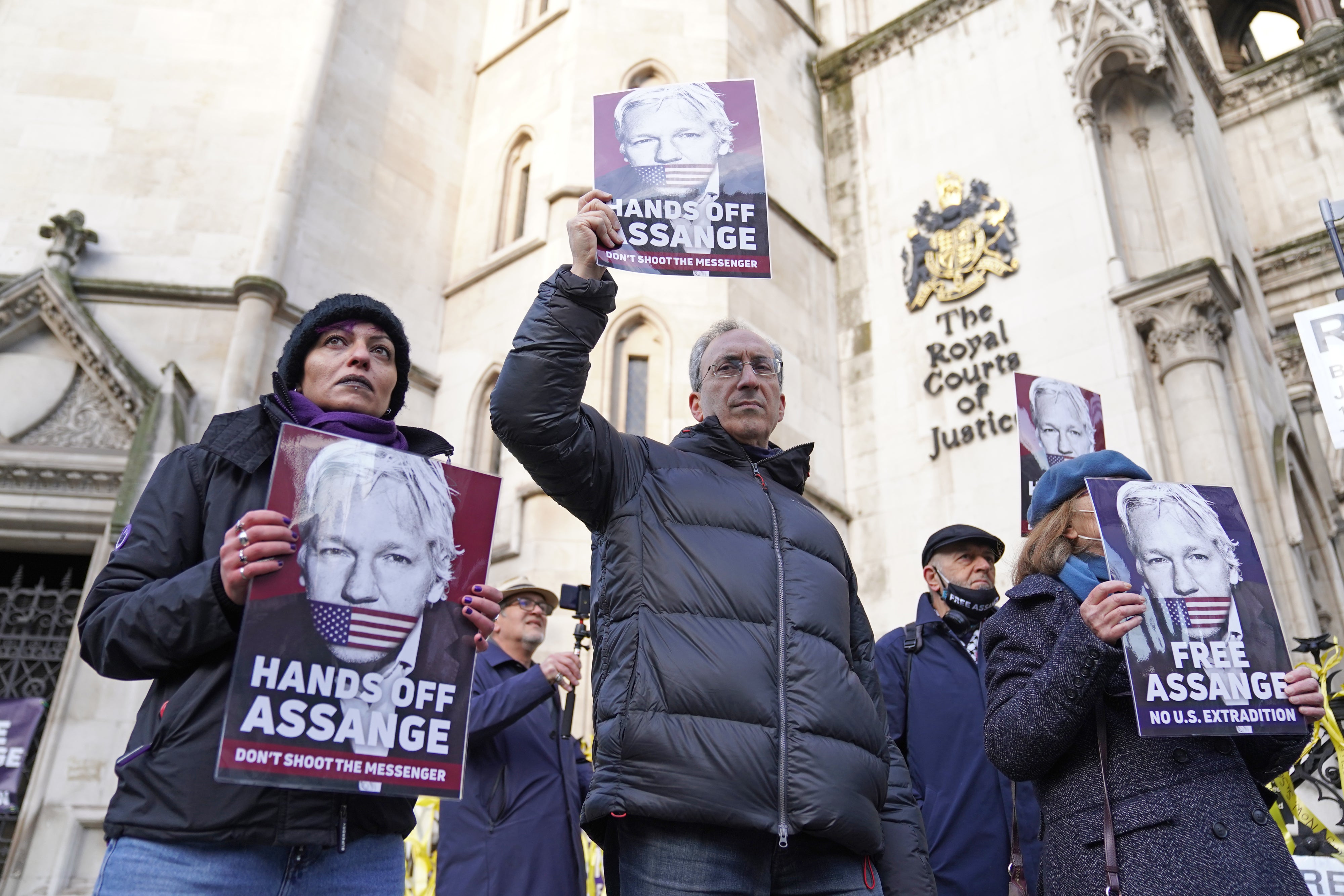Julian Assange can be extradited to the US, High Court rules
Two senior judges overturned a decision not to extradite the WikiLeaks founder

WikiLeaks founder Julian Assange can be extradited to the US, the High Court has ruled.
Assange, 50, is wanted in America over an alleged conspiracy to obtain and disclose national defence information following WikiLeaks’s publication of hundreds of thousands of leaked documents relating to the Afghanistan and Iraq wars.
US authorities brought a High Court challenge against a January ruling by then-district judge Vanessa Baraitser that Assange should not be sent to the US, in which she cited a real and “oppressive” risk of suicide.
After a two-day hearing in October, the Lord Chief Justice Lord Burnett, sitting with Lord Justice Holroyde, ruled in favour of the US on Friday.
The senior judges found that the judge had based her decision on the risk of Assange being held in highly restrictive prison conditions if extradited.
However, the US authorities later gave assurances that Assange would not face those strictest measures either pre-trial or post-conviction unless he committed an act in the future that required them.
Lord Burnett said: “That risk is in our judgment excluded by the assurances which are offered. It follows that we are satisfied that, if the assurances had been before the judge, she would have answered the relevant question differently.”
He added: “That conclusion is sufficient to determine this appeal in the USA’s favour.”
The judges ordered that the case must return to Westminster Magistrates’ Court for a district judge to formally send it to Home Secretary Priti Patel.
There is no basis for assuming that the USA has not given the assurances in good faith
Assange’s fiancee Stella Moris called the ruling “dangerous and misguided” and said they intended to appeal.
During October’s hearing, James Lewis QC, for the US, said that the “binding” diplomatic assurances made were a “solemn matter” and “are not dished out like smarties”.
The assurances included that Assange would not be submitted to special administrative measures (SAMs) and detained at the ADX Florence Supermax jail if extradited and that he would receive appropriate
But lawyers representing Assange, who opposed the US’s bid to overturn the block to his extradition, had argued that the assurances over the WikiLeaks founder’s potential treatment were “meaningless” and “vague”.
Edward Fitzgerald QC said that assurances not to impose SAMs on Assange or hold him at the ADX Florence Supermax jail pre-trial or post-conviction do not remove the risk of “conditions of administrative isolation”.
However, the two senior judges found there was “no reason why this court should not accept the assurances as meaning what they say” after Assange’s lawyers argued they should reject the assurances offered at the appeal.
“There is no basis for assuming that the USA has not given the assurances in good faith,” Lord Burnett added.
He continued: “In our view, a court hearing an extradition case, whether at first instance or on appeal, has the power to receive and consider assurances whenever they are offered by a requesting state.
“It is necessary to examine the reasons why the assurances have been offered at a late stage and to consider the practicability or otherwise of the requesting state having put them forward earlier.”
The senior judge added: “If, however, a court were to refuse to entertain an offer of assurances solely on the ground that the assurances had been offered at a late stage, the result might be a windfall to an alleged or convicted criminal, which would defeat the public interest in extradition.”
The US also said it would consent to Assange being transferred to Australia to serve any prison sentence he may be given.
Mr Fitzgerald previously told the High Court that Australia has not indicated whether it would accept Assange, who “will most likely be dead before it can have any purchase, if it ever could”.
However, in the ruling, Lord Burnett said: “The possibility that Australia may not be willing to receive a transfer cannot be a cause for criticism of the USA, or a reason for regarding the assurances as inadequate to meet the judge’s concerns.”
The High Court also heard that blocking Assange’s removal due to his mental health risks “rewarding fugitives for their flight”.
Mr Lewis said the then-district judge based her decision on Assange’s “intellectual ability to circumvent suicide preventative measures”, which risked becoming a “trump card” for anyone who wanted to oppose their extradition regardless of any resources the other state might have.
However, Mr Fitzgerald said the judge had produced a “carefully considered and fully reasoned judgment”, adding it was “clear” she had “scrupulously applied the test for oppression in cases of mental disorder”.
The two senior judges also said it was significant that Assange had argued multiple grounds for resisting extradition but had only succeeded on the issue of his mental health.
“He took every conceivable point. The judge found against him on all but one of those grounds,” Lord Burnett said.
Assange has been held in Belmarsh Prison since 2019 after he was carried out of the Ecuadorian embassy by police before being arrested for breaching his bail conditions.
He had entered the building in 2012 to avoid extradition to Sweden to face sex offence allegations, which he has always denied and were eventually dropped.
